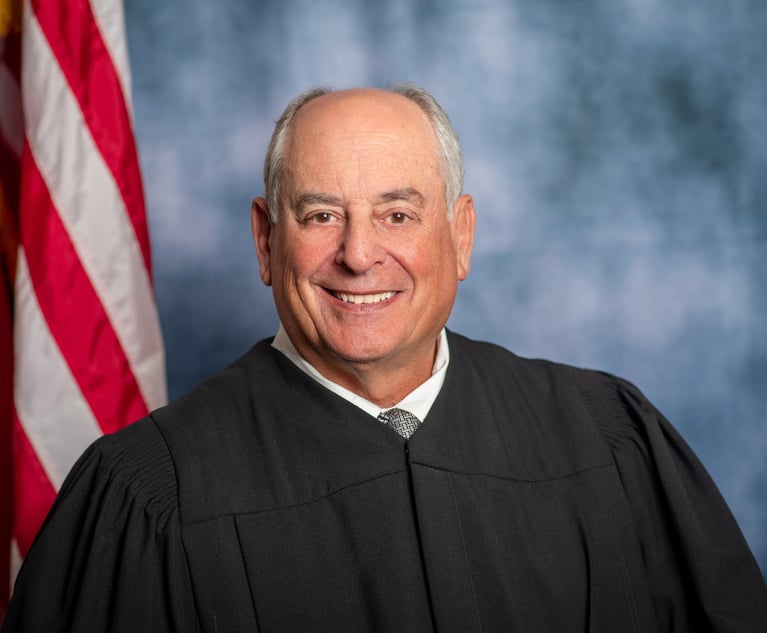 Gail Tusan, JAMS, Atlanta. (Courtesy photo)
Gail Tusan, JAMS, Atlanta. (Courtesy photo)COVID-19 Can't Slow All of the Wheels of Justice
If we learn anything from coronavirus-imposed social restrictions and business model modifications, let's keep the wheels turning toward increased efficiency in resolving disputes and turn to colleagues and available resources for help in controlling an uptick in backlogged dockets.
April 15, 2020 at 12:57 PM
4 minute read
Thanks to the COVID-19 pandemic and shelter-in-place orders, even for us in the legal profession, it may feel that we have lost control of our customary methods for resolving disputes. Without a doubt, dark courtrooms, closed courthouses, working remotely and social distancing threaten to derail the "wheels of justice."
Despite technological advances which have been available to attorneys and judges for some time, our justice system typically has defaulted to procedures and calendars requiring judges, court personnel, attorneys and parties to come to the courthouse and resolve matters in person. Have we not all witnessed a time or two when technology failed at a critical point during an argument or witness examination? Those occasional backfires should not keep us from learning how to implement technology in daily practice of law and court case management. Together, judges, neutrals and attorneys can keep the wheels moving with the aid of videoconferencing and other forms of technology.
A year ago, I retired from full-time judicial service after almost 30 years on the bench and transitioned to an arbitration and mediation practice. During my tenure as chief judge of the Atlanta Judicial Circuit, most discussions among the justice system stakeholders and citizens were premised on the importance of access to justice under all circumstances. Critical creativity in using alternative means of resolving conflicts was paramount in achieving the goal of all citizens, regardless of their means, realizing their "day in court" sooner than later.
During times such as these, those charged with administering justice must balance constitutional rights against the general safety and welfare of employees and citizens alike in determining how to make justice accessible to those who need it. Georgia Chief Justice Harold Melton, Fulton County Judge Shawn Ellen LaGrua, who is president of the Council of Superior Court Judges; Fulton County Chief Judge Chris Brasher, DeKalb County Chief Judge Asha Jackson and so many others are to be commended for their guidance and leadership during these difficult times. The chief justice's March 14 Order Declaring Statewide Judicial Emergency (Amended) highlights videoconferencing as an effective tool for judges to preside over proceedings in pending cases.
Likewise, arbitrators and mediators are equipped to help resolve your disputes using videoconferencing platforms such as Zoom, Teams and Skype. We are highly sensitive to the concerns that you and your client or judicial staff may have regarding security and confidentiality. Be assured, such measures are in effect and steadily improved with daily upgrades and enhancements.
In my new role as a retired judge/neutral, I am truly enjoying my freedom to speak more directly to parties and their counsel about their issues and the ultimate conflict. I am able and expected to speak more frankly and directly. Through premediation summaries, I learn so much about the parties and the impetus for their conflict. It's great for me to be able to relax my judicial poker face and be a bit more "real" with folks. Parties' personal revelations and the backstories provided by their counsel help me to engineer effective ways to break through impasse and achieve compromise.
During my church's live streamed Palm Sunday sermon, the Rev. Dr. David Anderson Hooker (who is also an attorney and a trained mediator) defined conflict this way: two ideas sharing the same space. I love that definition. My job as a mediator is to create a space where the owners of the two (or more) ideas can speak freely and enjoy mutual respect in expressing their candor. I also must listen carefully, using their cues and clues to help them reach a good, efficient and practical result. Likewise, as an arbitrator, my job is to create a space where both sides can be heard and to issue a decision that resolves the conflict.
If we learn anything from COVID-19 imposed social restrictions and business model modifications, let's keep the wheels turning toward increased efficiency in resolving disputes, and turn to colleagues and available resources for help in controlling an uptick in backlogged dockets. You don't have to wait for the courthouse doors to reopen or judges to enter trial notices to agree with your opposing party to engage a mediator or arbitrator to help now with resolving your case. Access to justice is achieved when perceived. Virtual opportunities are available now.
Senior Judge Gail S. Tusan is affiliated with JAMS Atlanta and serves as an adjunct professor at Emory University School of Law and Spelman College. Her judicial career included service on the Magistrate Court, City Court of Atlanta, State Court and Superior Court.
This content has been archived. It is available through our partners, LexisNexis® and Bloomberg Law.
To view this content, please continue to their sites.
Not a Lexis Subscriber?
Subscribe Now
Not a Bloomberg Law Subscriber?
Subscribe Now
NOT FOR REPRINT
© 2024 ALM Global, LLC, All Rights Reserved. Request academic re-use from www.copyright.com. All other uses, submit a request to [email protected]. For more information visit Asset & Logo Licensing.
You Might Like
View All
'A 58-Year-Old Engine That Needs an Overhaul': Judge Wants Traffic Law Amended
3 minute read
Fulton Jury Returns Defense Verdict After Pedestrian Killed by MARTA Bus
8 minute read
'The Best Strategy': $795K Resolution Reached in Federal COVID-Accommodation Dispute
8 minute read
Population and Caseload Boom Birth New West Georgia Judicial Circuit
7 minute readTrending Stories
- 1Decision of the Day: Judge Reduces $287M Jury Verdict Against Harley-Davidson in Wrongful Death Suit
- 2Kirkland to Covington: 2024's International Chart Toppers and Award Winners
- 3Decision of the Day: Judge Denies Summary Judgment Motions in Suit by Runner Injured in Brooklyn Bridge Park
- 4KISS, Profit Motive and Foreign Currency Contracts
- 512 Days of … Web Analytics
Who Got The Work
Michael G. Bongiorno, Andrew Scott Dulberg and Elizabeth E. Driscoll from Wilmer Cutler Pickering Hale and Dorr have stepped in to represent Symbotic Inc., an A.I.-enabled technology platform that focuses on increasing supply chain efficiency, and other defendants in a pending shareholder derivative lawsuit. The case, filed Oct. 2 in Massachusetts District Court by the Brown Law Firm on behalf of Stephen Austen, accuses certain officers and directors of misleading investors in regard to Symbotic's potential for margin growth by failing to disclose that the company was not equipped to timely deploy its systems or manage expenses through project delays. The case, assigned to U.S. District Judge Nathaniel M. Gorton, is 1:24-cv-12522, Austen v. Cohen et al.
Who Got The Work
Edmund Polubinski and Marie Killmond of Davis Polk & Wardwell have entered appearances for data platform software development company MongoDB and other defendants in a pending shareholder derivative lawsuit. The action, filed Oct. 7 in New York Southern District Court by the Brown Law Firm, accuses the company's directors and/or officers of falsely expressing confidence in the company’s restructuring of its sales incentive plan and downplaying the severity of decreases in its upfront commitments. The case is 1:24-cv-07594, Roy v. Ittycheria et al.
Who Got The Work
Amy O. Bruchs and Kurt F. Ellison of Michael Best & Friedrich have entered appearances for Epic Systems Corp. in a pending employment discrimination lawsuit. The suit was filed Sept. 7 in Wisconsin Western District Court by Levine Eisberner LLC and Siri & Glimstad on behalf of a project manager who claims that he was wrongfully terminated after applying for a religious exemption to the defendant's COVID-19 vaccine mandate. The case, assigned to U.S. Magistrate Judge Anita Marie Boor, is 3:24-cv-00630, Secker, Nathan v. Epic Systems Corporation.
Who Got The Work
David X. Sullivan, Thomas J. Finn and Gregory A. Hall from McCarter & English have entered appearances for Sunrun Installation Services in a pending civil rights lawsuit. The complaint was filed Sept. 4 in Connecticut District Court by attorney Robert M. Berke on behalf of former employee George Edward Steins, who was arrested and charged with employing an unregistered home improvement salesperson. The complaint alleges that had Sunrun informed the Connecticut Department of Consumer Protection that the plaintiff's employment had ended in 2017 and that he no longer held Sunrun's home improvement contractor license, he would not have been hit with charges, which were dismissed in May 2024. The case, assigned to U.S. District Judge Jeffrey A. Meyer, is 3:24-cv-01423, Steins v. Sunrun, Inc. et al.
Who Got The Work
Greenberg Traurig shareholder Joshua L. Raskin has entered an appearance for boohoo.com UK Ltd. in a pending patent infringement lawsuit. The suit, filed Sept. 3 in Texas Eastern District Court by Rozier Hardt McDonough on behalf of Alto Dynamics, asserts five patents related to an online shopping platform. The case, assigned to U.S. District Judge Rodney Gilstrap, is 2:24-cv-00719, Alto Dynamics, LLC v. boohoo.com UK Limited.
Featured Firms
Law Offices of Gary Martin Hays & Associates, P.C.
(470) 294-1674
Law Offices of Mark E. Salomone
(857) 444-6468
Smith & Hassler
(713) 739-1250






